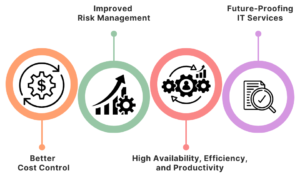Whether you’re a business leader or an experienced IT professional, incorporating managed services can simplify your work. A Managed Service (MS) operates like a full-fledged IT Department staffed with skilled experts to manage your company’s business applications effectively.
Let’s delve into Managed Services to understand when and how they can be advantageous for your organization.
What is a Managed Service?
In essence, a Managed Service takes over the daily management of your specialized applications. These services can:
- Enhance the capabilities available to your company’s end-users
- Allow your in-house IT team to concentrate on more strategic projects
- Enable your team to focus on your business’s primary activities
The need for managed services often becomes apparent when there’s a noticeable drop in IT service quality due to diminished knowledge within the team. Other indicators that you might need managed services include:
- Unmet goals from the previous year due to inadequate service and support
- Frequent service outages and downtime
- Exceeding the budget on adjustments to business applications, which reduces their performance
- Data loss due to insufficient solution handling
From our extensive experience with various clients, both small and large, we frequently recommend managed services to address these issues. Many clients using managed services have seen significant improvements. For instance, a large company we assisted reported seamless service integration and higher satisfaction among both end-users and IT support staff globally.
If these challenges sound familiar, consider these suggestions for reorganizing and empowering your IT Department through managed services.
Assessing the Need for Managed Services
Today’s IT managers face intense pressure to meet performance, operational, and security standards, all while controlling costs. Financial experts often recommend adopting a predictable cost model, such as managed services, under these circumstances.
Managed Service Providers (MSPs) are companies that offer these services. The ideal times to consult an MSP include:
- Setting future strategic objectives
- Implementing new IT services
Often, your current staff might lack experience with new technologies or struggle to maintain new services or applications. Hiring contractors is an option, but this can be costly and provide limited value within a constrained or shrinking budget. This applies to small, medium, and large companies alike.
Managed Service models have evolved, and experienced providers have fine-tuned their delivery. They are particularly effective for businesses that
- Depend on their IT infrastructure for daily operations
- Lack the trained staff or time for proper maintenance, updates, and repairs
- Prefer a fixed monthly fee for high-quality service
IT is fundamental to most business services, covering software, hardware, and the skills needed to keep services running. Building and maintaining an in-house support team requires significant investment. However, with the maturity of managed service models and the rise of virtualization and cloud technologies, the need for on-site IT staff can be minimized. Companies can leverage managed service experts for better IT cost predictability despite uncertain requirements.
Costs for Managed Service Providers (MSPs)
MSPs typically charge on a subscription basis. Pricing is usually based on the number of devices and aligned to service packages. Some MSPs offer on-site customer support when needed. Basic services often start with monitoring, which identifies potential issues for you to resolve. At the higher end, MSPs offer comprehensive services covering everything from alerts to problem resolution.
Benefits of Managed Services
 Better Cost Control: The cost of business services depends on their availability and criticality. MSPs absorb the typical costs of an IT department—such as training, equipment, and personnel—and present them as a fixed monthly fee. This helps with monthly budgeting. Managed services can scale based on future needs and the pace of your organization’s IT development.
Better Cost Control: The cost of business services depends on their availability and criticality. MSPs absorb the typical costs of an IT department—such as training, equipment, and personnel—and present them as a fixed monthly fee. This helps with monthly budgeting. Managed services can scale based on future needs and the pace of your organization’s IT development.
One major benefit is that companies can decide the extent of scaling based on financial and strategic considerations. Preventing IT service interruptions and outages mitigates the risk of further losses. For example, one client in the energy sector reduced multiple daily outages to a single scheduled outage per month.
Improved Risk Management: Every business faces certain risks, which can be minimized by reducing the individual risk associated with critical services. MSPs help reduce risk by applying their proprietary methodologies and utilizing modern infrastructure and software, adhering to best practices, and minimizing service delivery risks.
MSPs assume and manage much of the risk for the companies they serve by:
- Possessing specific industry knowledge, particularly around security and compliance issues
- Partnering with your business and advising on risk avoidance strategies in their areas of expertise
High Availability, Efficiency, and Productivity: In IT services, the phrase “time is money” holds true. For optimal performance, constant availability of mission-critical IT services is crucial. While assessing downtime costs is challenging, proactive measures can help avoid it entirely. At worst, downtime can damage your company’s reputation if it becomes publicly known, potentially eroding trust.
Clients experience better performance and minimal downtime with managed services. Mission-critical applications often involve multiple technologies that need to be operational and integrated to deliver the expected IT service. All component applications must work together seamlessly for internal end-users. MSPs ensure maximum uptime and minimal interruptions.
Organizations trying to handle all IT services in-house often face:
- Higher research and development (R&D) costs
- Longer deployment timelines
These higher costs are typically passed on to service consumers. In contrast, MSPs deliver IT services efficiently, keeping costs low and deployment times short while maintaining high-quality service.
Future-Proofing IT Services: IT departments will always encounter funding, technical, security, and operational challenges. Many organizations effectively use Managed Services to minimize resource constraints and achieve seamless service integration.
MSPs train their staff on new releases and technologies, locking in costs for multiple years. This predictability reduces operational risks and challenges, minimizing service disruptions.
Managed Service Best Practices: Managed Service Providers offer:
- Practical delivery of a predictable service model and cost to quickly and effectively implement new IT services
- Enhanced stability and peace of mind for IT and business leaders
Delivering new business services while controlling costs is difficult in today’s business environment. Managed services help your IT organization become highly resilient and cost-predictable year after year. MSPs complement existing staff, freeing them to lead and deliver strategic IT programs that advance business goals. In larger organizations, MSPs allow internal resources to focus on strategic projects. Rest assured that managed service offerings help minimize risks associated with maintaining client data and sensitive information.Simple Logic for Managed Services
When planning to invest in a new application, consider exploring various managed service options to address your IT business needs and mitigate risks. For more information, contact Simple Logic for Managed Services.




